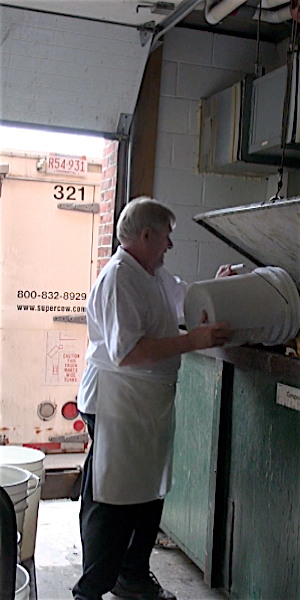We can help you take the next step!
With the adoption of New Jersey’s Food Waste Recycling Law (effective October 2021), there has been an increased focus on addressing wasted food across the state. CET is available to provide support in these efforts and is excited to contribute to the diversion of wasted food in New Jersey. To learn more, or to request assistance, contact CET today at 888-813-8552 or e-mail wastedfood@cetonline.org.
Helpful New Jersey Wasted Food Resources
-
-
Learn more about NJ businesses that are reducing, rescuing, and recycling their surplus food and waste. These businesses are an inspiration for many and can be motivational tools to inspire businesses and institutions to implement or expand their own programs.
-
- The State of New Jersey School Food Waste Guidelines
- Resources developed by The New Jersey Department of Environmental Protection, in consultation with the New Jersey Department of Agriculture, the New Jersey Department of Education, the New Jersey Department of Health, and the New Jersey Office of the Secretary of Higher Education, to advise K-12 schools and higher education institutions on how they can effectively reduce, recover, and recycle food waste.
- Helpful fact sheets on food donation laws from the Harvard Food Law and Policy Clinic:
- The Sustainable Organic Material Management Plan
- In August 2021, The New Jersey Climate Change Alliance Organics Workgroup published with Sustainable Organic Material Management Plan. The plan focuses on NJ’s current practices and opportunities for reducing food waste; maximizing the recovery of edible food; food waste management in schools; community-scale composting; development of large-scale organics recycling infrastructure; and sustainable animal manure management. CET participated as a Steering Committee member.
- Recycling facilities in New Jersey that accept food waste
- New Jersey Department of Environmental Protection list of recycling facilities in the state and indicates those facilities that accept wasted food.
- New Jersey Chapter of the U.S. Composting Council
- New Jersey’s state chapter of the U.S. Composting Council, a nonprofit organization that provides resources, educational materials, training, networking, and career advancement opportunities for those involved with the compost manufacturing and organics recycling industry.
- The NJCC has also created a New Jersey Food Waste Recycling Law FAQ and Guidance, which provides useful information about the law beginning in October 2021.
- Mid-Atlantic Food Waste Policy Gap Analysis and Inventory
- This report includes a review of current policies, regulations, plans, and goals in place that can help or hinder food waste diversion in four Mid-Atlantic states, including New Jersey. It provides a brief overview of existing policies, with links to more detailed information, as well as highlighting opportunities to further diversion. The report was developed for the NRDC, with support from CET, the Harvard Food Law & Policy Clinic, and BioCycle.
- Food Rescue Solutions for Jersey City
- In partnership with Jersey City and with support from Natural Resources Defense Council (NRDC), CET engaged stakeholders in the food redistribution sector in Jersey City to learn more about existing practices and future opportunities. This information, compiled in 2022, is intended to support Jersey City’s Department of Health & Human Services and Department of Public Works efforts in furthering food redistribution across the local surplus food marketplace.
New Jersey Legal/Regulatory Requirements
- Every state has specific state-level legal and regulatory requirements regarding food waste and food donation. ReFED, a national food waste prevention nonprofit, created a searchable database of state-by-state food waste policies and regulations, in collaboration with the Harvard Food Law and Policy Clinic. View the New Jersey food waste policy page for specific, up-to-date information about New Jersey’s food waste laws.
- The Emerson Act
- The Federal Emerson Act (Public Law 104-210) protects donors from liability when donating to nonprofit organizations and protects donors from civil and criminal liability should the product, donated in good faith, later cause harm to the needy recipient.
Toolbox
For more information regarding food waste estimates, source separation guidance, and how to start a food donation program, open CET’s Toolbox.
TAKE THE NEXT STEP, CONTACT US!
Contact CET to learn more about food recovery and waste diversion opportunities for your business, institution, customers, or association members:
